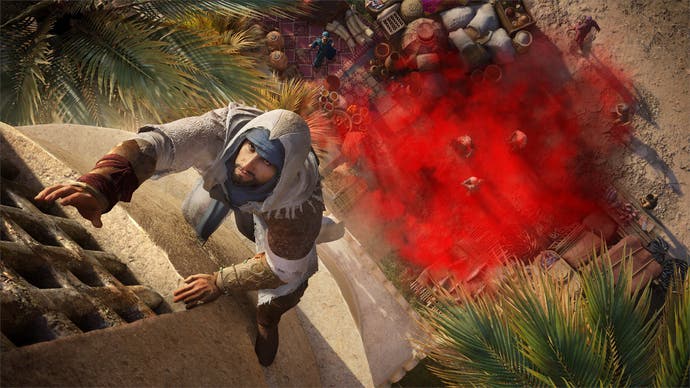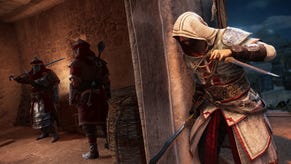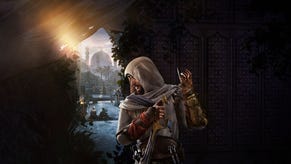Assassin's Creed Mirage review - a fascinating new city and the embrace of a classic formula
Jinn in a bottle episode.
Reader, I am in love with the House of Wisdom. Who wouldn't be? A vast palace of books with thick walls, beautiful ceramic window inlays and plenty of what the Californian real estate industry would refer to as an enviable indoor/outdoor flow. In the 9th Century, when Assassin's Creed Mirage is set, the House of Wisdom was one of the biggest libraries that had ever existed, mounted like a jewel inside a ringed city, Baghdad, that was on its way to being the largest city in the world. All of the Golden Age is visible here: the love of learning, of curating the lessons of the past but also looking to the future. Criers invite people for what amounts to TED Talks on astronomy, on the use of the astrolabe. Celebrity poets argue in the courtyards. Political intrigue is everywhere you look. Everybody has heard a rumour about something or other. There's a whole hierarchy of learning, both academic and, hmm, more illicit, to be navigated.
I love it. But what I think I love more is the immediate environment the House of Wisdom lies within. Surrounding the House is a lovely scholarly part of town, leafy climbing vines and cool honeyed brick, all lit by a clear morning sun. The shops scattered around the House, all angled lines and blind turns, are filled with stacks of books, shelves of books, books lying splayed on tables next to fruit and bowls of spices. I wandered here, mid-mission, for an hour yesterday, with no aims other than drawing it all in, all this detail and character. And I was rewarded, of course, as Assassin's will always reward the distracted. I found a bookcase with a secret behind it. I found a tall building with astronomical contraptions on the roof.
So. After the wild RPG sprawl of the previous few entries, Mirage is set in Baghdad at the height of the Golden Age. It's a more compact focus, and the city itself is more than deserving of the miniaturist's eye which the smaller Assassin's games can turn on their subjects. A great library is always a pleasure, but scattering the streets around it with books and scientific doodads is a real delight. It speaks to the city itself, coursing with intellectual curiosity and richness.
Mirage gives you a surprisingly large chunk of desert and countryside around the city too - someone's digging something up in the rocks, someone's doing something nasty at a distant farm, and by an oasis in the middle of nowhere you can linger for a few hours and be attacked by deer - but the city itself is the heart of the game in every way. It's the city where the game's hero, plucky street thief Basim - charming, sad eyes, horrifying dreams - works his way through the ranks of the Hidden Ones. And it's the place where Basim must take on a whole infrastructure of intrigue and corruption, moving around the stations of the clock, as it were, and then, mixing metaphors and heading for the bull's eye in the center of the ringed city.
I never tired of Baghdad. At its most basic level, the city is built around a series of set-piece buildings, like the House of Wisdom, all of these surrounded by streets to explore, pick pockets, lose yourself in after a murder. Ubisoft's designers are wonderful at the quiet stuff - streets that always lead you somewhere interesting, and spots where the detailing changes from book shops, say, to rich flower beds and piles of spices. But they truly sing with buildings that are great traversal riddles, with ledges and finials that can be grasped, spikes that keep you away, keys in wandering guards' pockets, and doors that can only be opened from the other side (a lift, perhaps, from Souls games). These buildings, which each mission chain slowly moves towards, are perfect for a game based on assassinations, with all those crowds and inner sanctums. But they're also perfect for a game that increasingly frames its assassinations as investigations, a series of interlocking mysteries that build to the unveiling of the main baddie, but also stand on teetering platforms of human weakness.
If this feels like a throwback to the earlier Assassin's games, Mirage is pretty open about it. This is a game about sneaking and stabbing people quietly and efficiently and then hiding their bodies in bushes or out of sight behind some crates. It's been a while, frankly. For the first few hours - after the inevitable tutorial with its inciting tragic incident - I struggled to understand this. I approached Mirage's clockwork locations as if they were something looser and broader, more like stuff plucked from Odyssey or Origins, so I sailed in, highly visible, and made a loud noise with my sword and all that jazz.
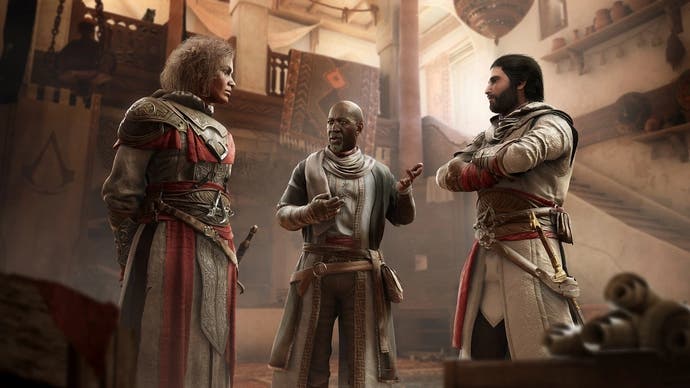
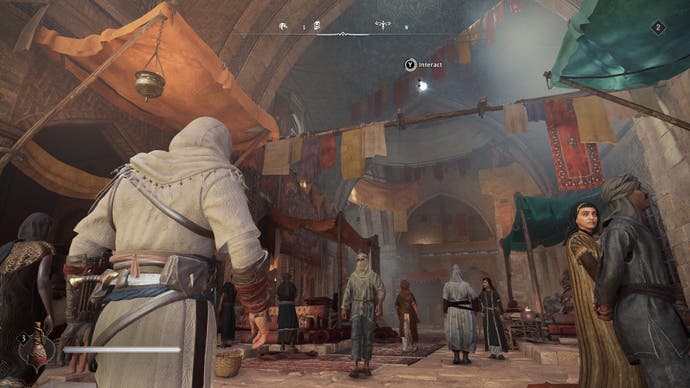
Wrong approach. Combat is actually rather clunky in Mirage. The full-on brawls of the Greek Assassin's outing in particular are significantly pared back in a game that has stealth at its centre once more. Wading in I was quickly killed, but also slightly disappointed, faced with lumbering animations and a muddle of parryable and non-parryable attacks that often overlaid each other in spell-breaking ways. But I listened, and I think what the game was telling me is that all-out combat is never the right approach anymore. After that, I settled into a more thoughtful ritual of perimeter shivs and slowly working my way forward to each buried objective, and the game duly blossomed with character and pleasant tension and a sense of purpose, of being in the right place and behaving in the right ways. I would wander and hunt for intel, listening in on conversations, seeking out open windows and scouring the rooftops with my eagle. Then I would try to act as invisibly as I could. To actually be an assassin rather than a theatrical and indiscriminate butcher. (If you can get theatrical butchers.)
There are rewards for this, not just in the sense of a job well done, and that longing for tidiness and economy in all things that always used to lurk deep inside Assassin's games. For one thing, there are cool gadgets to use: the throwing knives, smoke bombs, traps and all that, making their returns from various parts of the Assassin's back catalogue. There's also a sort of focus attack, which I properly love, which is charged, I think, with kills, and then allows you to select a range of baddies and basically take them down for free. It's all part of the Ubisoft Mechanics Universe, loosely pinched from Splinter Cell's glorious mark-and-execute, and it slots into Assassin's beautifully. I performed this move in the game's final mission and swear I killed a cluster of five guards at once. Something to write in the diary! It can also be cranked up in what's otherwise a fairly uninspiring trio of skill trees, most of which are concerned with your eagle or gadgets.
The skill trees, along with the differing weapons you pick up and the whole tab of the menu system concerned with your belongings, feel like a vestige of the RPG Assassin's design, which Mirage has all but otherwise moved away from. Instead of growing more powerful, Mirage is at its best when you grow more sensitive to the streets and what you can do there. There are special targets to pickpocket, special targets to shiv, special books to hunt for. There are wanted posters to tear down to cool the guards who are after you, criers to bribe, books and poems to read and rumours to listen out for. It’s felt like a long while since I'd played an Assassin's game that worked like this, at street level, moving at the coursing pace of wandering pedestrians. It felt good to be back.
And I learned something too. Listen: I had a dream many years ago, when Assassin's Creed was in its own Golden Age, a feature of every holiday season, a guaranteed spot on the calendar, and in this dream I was attending an unveiling of the next game in the series. And the next Assassin's Creed was set not in a city or a historical era, but inside EA's FIFA games. You know, your assassins were out there, hooded, on the pitch or patrolling in the stands. One annual series slotted inside another, it was probably called Assassin's Creed: Off-side, or something. Isn't the off-side rule about lurking?
It made sense at the time, but after Mirage I'm glad to say it makes less sense. I have frequently looked at Assassin's games as historical adventures with a bit of wonky sci-fi glamour, and Mirage's late-game certainly conforms to the formula in this regard. But what Mirage, and Mirage's Baghdad in particular, have reminded me is that the historical stuff is where the real care is found. The past-civilisations stuff feels like endless JJ Abrams intrigue - questions that will only lead to more questions, because providing answers would mean an end to the whole thing, to the flow of commerce. But in the recreation of a place like Baghdad, you get not just learning, but imagination and imaginative leaps of understanding in the name of learning. Of course the House of Learning would be surrounded by book markets. And of course, a game set in 9th Century Baghdad would feature grand buildings that include, alongside markets and dockside warehouses, a library and a hospital. I love, perhaps more than anything, that this game shows you Baghdad at its most powerful, influential, its most culture-creating and knowledge-expanding, and then leaves you to think about that.
Prose, goes the old Orwell quote, should be like a windowpane. Not sure I agree with that all the time, and actually, I'm not sure that Saint George agreed with it all the time either. But for a game like Assassin's I've realised that design formula, the ludic equivalent of prose, really does work a bit like a window pane in its best moments. Through the warmth of familiar rituals returning after those bigger, rangier games, I get to see what's really special about this series, what it takes to create, perhaps, and what it can give us in return.
